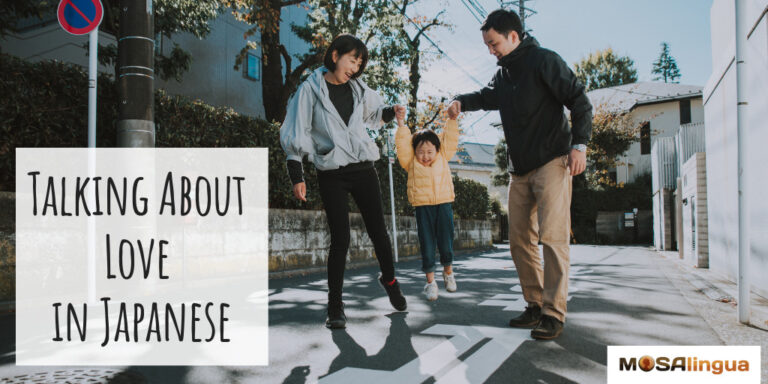Anyone who is looking to enrich their Japanese vocabulary and improve their comprehension of Japanese culture has probably wondered: how do people express love in Japanese? Does this Eastern culture share the same ideas and words as the Western world when it comes to love? This is a big question that covers both linguistic and social elements, so let’s dive in!

Love is a nuanced emotion, and there are three different words in Japanese that capture various degrees of this feeling. Each word has a specific origin and can be used to describe different relationships. The word most commonly used to translate “love” in kanji is 愛. (romaji = あい, pronounced “ai“). There’s an interesting history behind this word. It originally comes from Chinese ideograms imported in the 5th century. The term wasn’t integrated into the Japanese kanji system until the 10th century, when the verb 愛す (aisu) appeared. 愛 describes the feelings that one human being feels for another, but careful—there’s a hierarchical order to it. It’s the feeling that an individual of superior rank has for an individual of lower rank. For example, this Japanese term of endearment could describe the relationship a mother has with her child, or even an owner with their pet. It encompasses feelings of care and affection and doesn’t necessarily need to be reciprocal. Interestingly, around the time of its popularization, this term acquired a bit of a negative connotation. The dominant belief system was Buddhism, which viewed any attachment to terrestrial beings as a source of suffering. The connotations of the term 愛 fall far from the Western idea of romantic love. The cultural view of this term has evolved over the centuries, again through the intermediary of China. When Christianity was introduced to the region via Chinese translations of the Bible, the authors and translators of the Meiji era (1868-1912) used the word 愛 to refer to the idea of universal, Christian love. Over time, other words from the indigenous Japanese language – iro and koi (which we’ll discuss next) – took on other connotations to designate physical and erotic love. Unlike the term 愛 (ai), the word 恋 (こい, pronounced koi) existed in the original Japanese language, called the Yamato language. In a word, it expresses desire and the feeling that occurs when a person is unable to act on the love that they feel. It encompasses impossible, unsatisfied love, or sentiments that are felt before a relationship is established. In the Man’yôshû (first collection of waka – Japanese poetry written around 760 AD), the word koi appears about 30 times in its ancient graphism 孤悲 (ko-hi), which often employs the ideograms meaning “solitude” and “sadness.” Generally, this is a sensual love that becomes concrete in the presence of the other person, through sexual consummation. Here’s an interesting example of this word in context: The term 恋愛 is a combination of 恋 (koi) and 愛 (ai). According to the French Japanologist and researcher Jean-Michel Butel, the word ren’ai was created to describe an idealized love. This love corresponded to the understanding that 19th-century Japanese intellectuals had of the Western conception of love. At its origin, the term ren’ai is a discourse on love in Japanese culture, born from the circulation of modern literature in Japan. That is – stories that placed the relationships between men and women at the forefront. Two factors led to the phrase 恋愛 becoming a common word in modern Japanese: Today, the term ren’ai is the most accurate and common way to refer to romantic love between two individuals. Have a look at the use of 恋愛 in these two examples: We’ve covered some of the nuances surrounding how love is talked about in Japanese culture. Now let’s have a look at a few different ways that you can say “I love you” in Japanese. Even though the closest translation of “I love you” into Japanese is 愛してる or あいしてる, you won’t hear this expression very often among native speakers. It’s considered too solemn and imposing. Instead, you’ll hear more subtle, less direct expressions that reflect the reserve that’s typical in Japanese culture. 好き means love in a very general sense, and is not limited to love between two people. You can use this word to express that you enjoy an activity, a country, an object, etc. It’s also common to use this word to talk about people that you love, whether it’s a partner, family member, or friend. By adding 大, which means “much” or “a lot,” you can amplify a word meaning “to like”/”to enjoy” to “to love”/”to adore.” “Adore” is definitely a more intense word than “love,” but it can be used casually to express preference for people and objects. You can, of course, use it to refer to people that you love deeply. You can also add the element です to both 好き and 大好き to mark a level of politeness. But be careful: it’s also interesting to note that, unlike many other languages, Japanese doesn’t generally require the use of personal pronouns like “I” or “you.” This means that a simple ” 好き ” can be translated as “I love you” or “You love her/him,” according to the context. There are all kinds of other useful Japanese words about love. Here are a few of them: Also, here are a few fun Japanese pet names for couples. However, it’s important to note that Japanese couples are typically private and wouldn’t use these expressions in public. This article addresses some of the nuances in the concept of love in Japanese language and culture. There are several different ways that the word “love” can be translated into Japanese. There’s no single term that accomplishes this, and each different expression has its own origin, history, and context. Feel free to share your thoughts and questions in the comments. Happy learning! How to Express Your Love in Japanese
愛 (ai) – to express platonic love in Japanese
恋 (koi) – to express passionate love in Japanese
恋愛 (ren’ai) – to express romantic love in Japanese
Different Ways to Say “I Love You” in Japanese
愛してる (ai shiteru)
好き (suki) or 好きです (sukidesu)
大好き (suki) or 大好きです (sukidesu)
Other Ways to Talk About Love in Japanese
Conclusions
Next Steps
Related posts:
Start improving your Japanese today

Good news: we can help!
More good news: you can get started for free! With your free trial, you can test drive the most effective way to learn Japanese for the next 15 days!
Vocabulary flashcards, videos with subtitles, audiobooks, articles adapted to your level—with MosaLingua Premium (Web & Mobile), you’ll have access to all this and more. Get started right now. It’s free—and risk-free—to try!





Comments